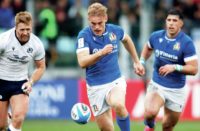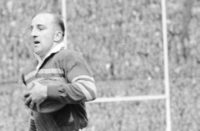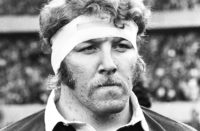 Phil Davies and Simon Easterby go back a long way, to a Third Division scrap in West Yorkshire during the pioneering weeks of professionalism.
Phil Davies and Simon Easterby go back a long way, to a Third Division scrap in West Yorkshire during the pioneering weeks of professionalism.
The Welsh veteran known in the trade as “Tulip” lined up as player-coach for Leeds at Harrogate on October 6, 1996. The home team's No.8 introduced himself in time-honoured fashion.
“He gave me a clout,” Davies said. “Simon was young and exuberant. I was old and slow but you could say that he certainly left an impression …”
It must have been quite a hit because its impact will be felt at various stages during the new RaboDirect Pro12 season which kicks off on Friday night with a Welsh-Italian double.
As the Ospreys open their title defence in Treviso, the Newport Gwent Dragons welcome the brand new Zebras from Parma to dear old Rodney Parade.
The following day Davies begins his reign as head coach of the Cardiff Blues by taking the under-achieving capital team into a fixture nobody fancies even in the best of weather – Connacht in Galway.
Easterby opens his account as head honcho of the Scarlets at home to European champions Leinster.
Their careers would probably have taken very different paths had Easterby not given Davies that little something to remember him.
The Welshman, then at the start of a ten-year stretch at Headingley during which he took Leeds from the depths to a winning Powergen Cup final at Twickenham, was so impressed by what Easterby did at Harrogate that he signed him.
“We had a bit of a spat on the field,” he said. “It happened and I thought nothing more of it. Then Phil rang me up and asked if I was interested in becoming a professional rugby player at Leeds.”
The following season Davies put the farmer's boy in the back row alongside a flanker who never got anywhere near an international cap – the current England head coach, Stuart Lancaster.
Easterby may have sounded as White Rose as Yorkshire Pudding but he knew exactly where he was going. The son of an English father and an Irish mother, he had been wearing the green from an early age. Before the turn of the century, he had embarked on a long reign in the Ireland back row and an even longer one in the Scarlet of Llanelli.
Nigel Davies' summer decision to leave Wales and take charge of Gloucester cleared the way for his No.2, Easterby, to become the main man at the Scarlets. Davies had by then been installed as the Blues' director of rugby, a case of chairman Peter Thomas finally getting his man.
A season during which the Blues did nothing more than make up the numbers demanded a change at the top. Davies, whose contract as forwards' coach at Worcester Warriors still had two years to run, asked for permission to speak to Cardiff who wanted him badly enough to pay his previous employers what Warriors owner Cecil Duckworth described as “modest” compensation.
Davies, 49 in October, inherits a squad which can only get better. They have fallen a long way since the famous Amlin Cup final victory over Toulon on the Mediterranean, their refusal to push the boat out and buy James Hook from the Ospreys a major contributory factor to their slide during the two
seasons since that marvellous Sunday in Marseille.
Easterby, 37 last month, faces a devilish problem peculiar to all the Welsh regions – how to satisfy the considerable demands of the national team without undermining their bid for the Pro12 and the last eight of the European Cup.
Welsh demands last season meant that George North, for example, played twice as often for his country as he did for his region.
“That's the challenge for me, to get that balance right,” Easterby says. “As head coach, the buck stops with me. That's where the responsibility starts and finishes.”
The knowledge that the Pro12 title resides in the Ospreys' trophy cabinet on the other side of the Loughor is all the motivation the Scarlets need to go one better than last season and ensure they make the play-offs. European champions Leinster are first up at Parc-y-Scarlets on Saturday, an all-Easterby family affair.
Guy, at 41 the elder by four years, will be there in his capacity as the province's team manager, having played 27 times for Ireland during the course of serving four clubs – Rotherham, London Scottish, Ebbw Vale and Llanelli.
Leinster, invariably shorn of their international contingent for the opening weeks, began last season in Wales, losing 27-3 to the Ospreys in Swansea.
Easterby v Easterby at least guarantees a family winner. “As brothers we are reasonably close,” says Simon. “We speak all the time. I have the greatest respect for what Guy has achieved and how much influence he has on Leinster. We will be the best of enemies for 80 minutes.”
They will be so again at the same place some six weeks later for the still more serious business of the Heineken Cup. Leinster are due back on October 20 for the second round of the six-match pool stage, a date which offers the younger Easterby the supreme challenge of knocking the best team in Europe off its perch.
“Leinster have got everything right – playing, coaching and recruitment,” he says. “They don't waste opportunities but that doesn't mean that we can't beat them.”
The Dragons launch the new Pro12 season on Friday night against the Zebras, the newly-created Italian franchise based in Parma and led by their 94-Test lock, Marco Bortolami. The Ospreys, last seen famously beating Leinster in an unforgettable Grand Final three months ago, kick off five minutes later.
The reigning champions, revitalised since Steve Tandy's inspired appointment as head coach last February, open their campaign at Treviso, hoping to be the first Celtic club to retain their title.
The real trick will be to emulate Munster and Leinster and turn the Celtic League into the European Cup.
Glasgow hope to raise glass to a Celtic vintage
Glasgow went to some trouble this week to promote rugby in a city obsessed with football.
The city launched the Pro12 in time-honoured fashion, pushing the boat out from the £74m Riverside transport museum on the banks of the Clyde within drop-goal distance of the Govan shipyards.
The previous night, they had wined and dined the competing clubs from five countries in the gilded splendour of the city chambers.
“We are up for the development of rugby in our city,” councillor Archie Graham, chair of Glasgow Life, told guests. “It is a very important sport for us, particularly in the run-up to our staging of the Commonwealth Games in 2014.”
The Glasgow Warriors reopen for business at Scotstoun, a new venue in the West End of the city eager to build on last season's achievement of doubling attendances.
After a season when Celtic clubs outnumbered those from England and France at every knock-out stage of the European Cup, Pro12 chairman Andy Irvine looks forward to more of the same after a “vintage year”.
“We had five teams among the last eight and three among the last four,” he said. “The final was real box-office, a tremendous game of rugby and a magnificent advertisement for our game.”

























